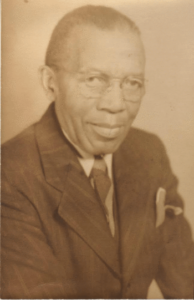
William Chance Sr.
*William Chance was born on this date in 1880. He was a Black educator and humanitarian.
William Claudius Chance, Sr., was born in Parmele, North Carolina. His parents were W. V. and Alice Chance, and his grandparents, who raised him, were Bryant and Penethia Chance. All were former slaves. Brought up on a small farm in poverty-stricken Martin County, Chance set out early to improve his living conditions.
After struggling through high school while working on the farm, he entered North Carolina Agricultural and Technical College in Greensboro. Four years later, he graduated with honors and an A. B. degree in agriculture. He received additional education from Howard University, spending four years there, of which the last year was devoted to the study of law. He earned other credits intermittently from Hampton Institute, North Carolina College at Durham, and La Salle University in Chicago, Ill. After attending Howard's law school, Chance became impressed with the idea of building a school to improve the plight of Blacks in Martin County.
After returning to Parmele in 1909, he witnessed the dreadful condition of the only local school for Blacks, among other deficiencies. This school had one room, sixty pupils, one teacher, and a $160 annual appropriation from the state for its operation. He founded a private school to help remedy this situation, using his home and a community church as facilities. Serving as principal and one of the three teachers, he initially attracted about thirty students. The teachers, mostly without salaries, provided a practical education for two years, emphasizing agriculture, industrial and mechanical arts, and domestic science.
Chance's school was the first in Martin County to initiate a long school term, eight months yearly. Later, in 1911, the Black public school and his private school merged to become Parmele Industrial Institute, a public school of which Chance was chosen as principal. Because of Chance's devotion to his school throughout the years, the community changed the school's name to W. C. Chance High School. Under his leadership, the school in 1948 had the highest percentage of graduating seniors entering college (70 percent) of any school in Martin County (the average was 50 percent). His former students became attorneys, doctors, college presidents, deans, businessmen, ministers, school principals, and teachers.
In 1948, Chance filed a successful challenge to the Jim Crow policy on the Atlantic Coast Line Railroad. Chance v. Lambeth filed suit to recover damages from the railroad because of his race; he was wrongfully ejected from a railroad car on June 25th that year in Emporia, Va., and subsequently subjected to unlawful arrest and imprisonment in connection with this ejection. Two years and four court actions were heard in the U.S. Court of Appeals for the Fourth Circuit, which ruled in favor of Chance and outlawed the Jim Crow policy in interstate travel.
Chance was married twice: in 1917 to Evelyn Payton, who died in 1927, and in 1929 to Julia Johnson, who died on 8 Mar. 1972. He had seven children. William Chance died in Lynchburg, Va., while visiting his daughter and ailing wife, a patient in Guggenheimer Hospital. His body was returned to Bethel for burial, about four miles from his birthplace in Parmele.